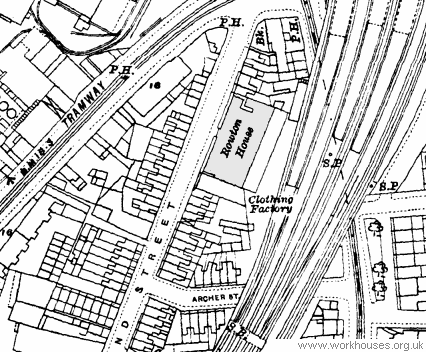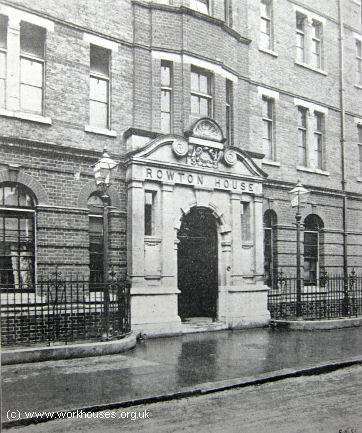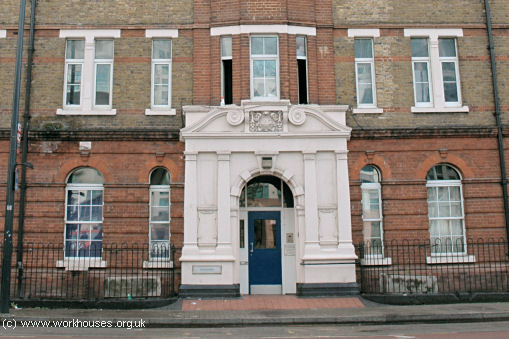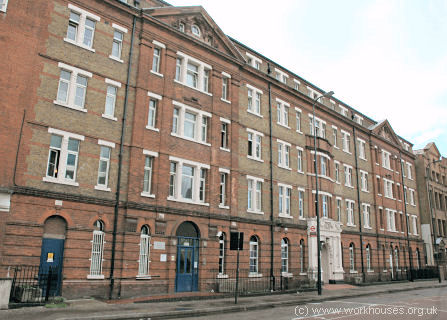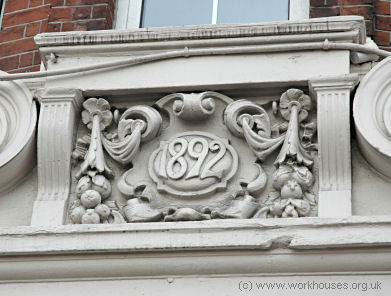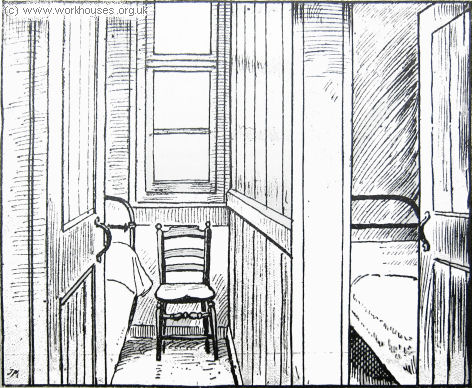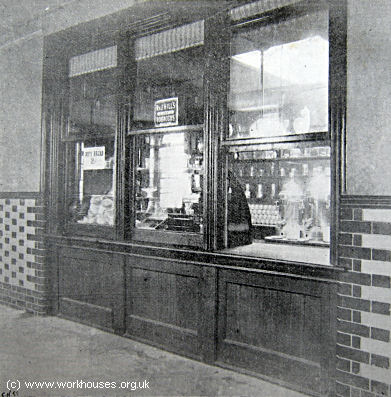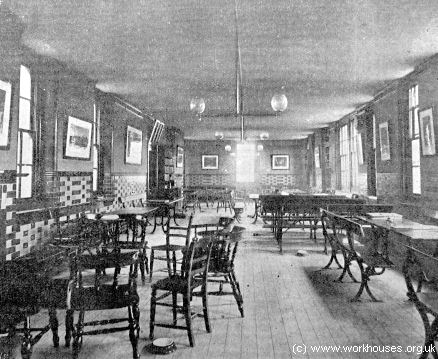In 1892, a new type of hostel for down-and-out or low-paid working men appeared in London — the first of the Rowton Houses created by philanthropist Lord Rowton. His aim was to provide a cheap accommodation that was better and cleaner than anything else available at the time. He put up the then enormous sum of £30,000 of his own money to finance the scheme. An overview of Rowton's scheme is given on a separate page.
The first Rowton House, at Vauxhall, was the prototype for what eventually became a chain of six such establishments in the capital. It opened on 31st December 1892 at Bond Street (now Bondway) in Vauxhall. The location is shown on the 1916 map below.
Vauxhall Rowton House site, 1916.
Vauxhall Rowton House, 1895.
© Peter Higginbotham.
Vauxhall Rowton House, 2006.
© Peter Higginbotham.
Vauxhall Rowton House, 2006.
© Peter Higginbotham.
Vauxhall Rowton House, 2006.
© Peter Higginbotham.
The sleeping accommodation comprised 470 bedded "cubicles".
Bedroom cubicle at Vauxhall Rowton House, 1895.
© Peter Higginbotham.
In stark contrast to the squalid conditions of the casual ward and many common lodging houses, residents of the new "working-mans' hotel" were given clean sheets, the use of tiled wash rooms, footbaths, washing troughs and drying facilities for clothes, and ample supplies of hot water. The establishment also including a large dining-room and a library. On its first night of opening, only 77 beds were occupied, but the news soon spread about the undreamt of luxury to be had for 6d a night. In its first year of operation, a total of 140,105 beds were let, making the establishment a commercially profitable enterprise.
Vauxhall Rowton House — dining-room, 1895.
© Peter Higginbotham.
Rowton took a close and personal interest in every detail of the building, which he affectionately referred to as the "beehive". In the lavatory (washroom) the basins were amply spaced, and hooks provided above so that a man could hang his hat and coat high up above the basin so he could keep an eye on it. The furnishings were carefully chosen and Rowton even took one of the proposed beds home to test it out. Most of the beds were in single-bedded cubicles — a few multi-bedded rooms were originally included but proved unpopular and were soon converted to single ones.
Vauxhall Rowton House — shop and bar in dining-room, 1895.
© Peter Higginbotham.
The new venture was not without teething problems. In its early days, the house had a high turnover of staff and the administration of the home was falling into chaos until a Superintendent, a former sergeant-major, was appointed. Within a few weeks of opening, every book in the house's library had disappeared, resulting in the installation of lockable bookcases under the charge of a paid librarian. At the first fire-drill, every copper coupling and nozzle from the fire hoses was found to have disappeared. Soap ceased to be provided for free after it was being consumed in prodigious quantities.
LORD ROWTON'S MODEL LODGING-HOUSE.
The Poor Man's Club, where he finds a Comfortable Home,
Good Food, and Wholesome Recreation.
THE erection of Rowton-house, Vauxhall, inaugurated a new departure in the housing of the poor in London. It was the first building specially designed and constructed as a common lodging-house. Rowton-house was intended to accommodate men belonging to the laboring classes who have no fixed home, and others whose earnings are small and whose employment is uncertain. This vast section of our population — the class of industrial nomads and casual workers — had hitherto been sadly neglected. There was not a single lodging-house in London which had been specially designed and erected as such. Without exception they were adaptations, badly constructed and arranged, without any means for protecting the health of the occupants or providing them with a modicum of comfort. Dozens of men were huddled together in the same room. There was no pretence of maintaining cleanliness, and the greatest possible facility was given for the propagation and spread of disease. These lodging-houses were also centres for the dissemination of evil influences; the honest casual, the loafer, and the criminal were all packed together, and the poor man who had only a shilling with which to pay a night's lodging was subjected to contaminating surroundings. It was these appalling facts which induced Lord Rowton to take up the business. He knew the degrading conditions under which thousands of men were obliged to live. He knew also that it was hopeless to expect a better class of lodging-house from the same class of owners, and that it was useless to ask laborers not to frequent such places, as they had no alternative. Before be took the bold step of building a house himself he had visited almost every common lodging-house in London. He had most carefully studied the minimum requirements of the class who had no alternative but to inhabit them. It was not the circumstance that he was nephew of Lord Shaftesbury which induced him to take up the question. He had a natural and strong desire to improve the conditions of the poorest of the people, and particularly to bring to bear upon them the elevating influences of a heal thy and comfortable home. Lord Rowton took an active part in the investigations which induced Lord Iveragh to give £250,000 to found the Guinness Trust, which provides homes for families of the very poorest workers who live on less than 20s. a week, and he is one of the trustees. Before he started his own enterprise he went all over the country and inspected the best types of common lodging-houses, including the municipal institutions at Glasgow. When he had resolved to build a really model lodging-house, Lord Rowton went to Mr. R. E. Farrant, of the Artisans and Laborers' Dwellings Company, who had probably more experience that anyone else in the provision of dwellings for the poor. Mr. Farrant rendered invaluable assistance, with his technical knowledge, in designing, constructing, and equipping the building, and continues to take active interest in the administration, while his advice and practical aid in the development of the new building in King's Cross-road is of great value. Lord Rowton invested £30,000 in what, after all, was a risky undertaking. Such, then, was the origin of Rowton-house, the beginning of a revolution in the housing of the poor. Soon after it was opened the County Council's municipal lodging-house was established, and these two institutions, by setting a higher standard, have been the means of stimulating other landlords to improve their dwellings.
ROWTON-HOUSE, VAUXHALL
Rowton-house is in Bond-street, Vauxhall, a few yards from Vauxhall Station. The site is well chosen, as it is near a convenient centre for rail, 'bus, and tram services. The house is well and substantially built of red brick-work, relieved here and there with stone. Glazed brick has been used largely in the interior in the interest of cleanliness. Much depends in such a house on the internal arrangements and in the quality of the material used. Let us make a tour of inspection and examine the leading features of this huge hotel for the working-classes. Enter the hospitable-like doorway and you soon come to a turnstile, where, if you are a lodger, you pay your money and take what choice in the way of a room is left for you. The charge is 6d. per night, but this carries with it the right to occupy the house during the day of arrival and on the following day as well, which is 36 hours' occupation for 6d. Lodgers are given a ticket with a number, a key to a locker, and the manager, Mr. Hyatt, takes the money and the name of the guest. Several lodgers are sitting about in the corridors, where benches are provided. To the left of the entrance on the ground floor is a large smoking room with comfortable seats. Lord Rowton has paid close attention to the combination of color he has introduced as well as of the quality of the materials used. Here in the smoking-room, and in other rooms, the walls are built to dado height with chocolate and cream tinted glazed brick-work, while the rest of the wall is of a terracotta hue.
THE DINING ROOMS: THE POOR MAN'S MENU.
To the rear of the building on the ground floor are two large dining rooms, and here we have an example of the thought which Lord Rowton has bestowed on the small details of the arrangements, as well as on the main features of the building. The
tables and benches are fixtures and are of teak. This wood was chosen because of its hardness. The benches have
been arranged so that the men do not knock their knees against the supports of the table when sitting down and
do not touch each others' backs. The space has been measured off to a nicety, and accommodation provided for
eight persons to sit comfortably at each table. About 200 lodgers can dine at the same time. A shop is on
one side of the dining room for the sale of any food — cooked or uncooked — and temperance refreshments and tobacco for the lodgers. The shop is kept exceptionally clean, and the articles supplied are better in quality
than can be obtained at the shops in the neighborhood. Tea is sold at 1d. per cup, a slice of bread and butter ½d., bloaters 1d. each, a plate of roast beef 4d. and 6d., vegetables 1d. and ½d., rice pudding 1d., cold meat 2d. and 3d. per
plate, corned beef 1d. and 2d. per plate, ginger beer and lemonade 1d. There is a great demand for ½d. packets of tea, sugar, coffee, and cocoa, and a variety of other articles, cooked and uncooked. The establishment is licensed
to sell tobacco and cigars and the lowest retail prices are charged. Soup of first-rate quality is supplied at a penny per bowl and is in great favor. There is also a run on penny plates of rice pudding, while the establishment supplies various viands costing any price from a farthing to sixpence. It at the same time gives facilities for the lodgers cooking their own meals.
They have a kitchen for their use fitted with a large range and oven, boiler, &c., and a large stock of utensils. All necessary plates, cups, teapots, &c., are supplied to them. Besides this there are four large cooking ranges in the
dining rooms, with ovens, hot plates, grills, and water constantly boiling. Near this part of the building are the rooms fitted with lockers for the men. Each lodger gets a locker which for the time being is his exclusive possession,
as he carries the key. It will hold his clothes, if he has a change, and his cooking utensils, if he has brought any with him. It is his wardrobe, his store, and his larder. It will be seen that men can live for little and well in Rowton-house.
SANITARY ARRANGEMENTS.
The sanitary arrangements of a great barracks, where nearly 500 men are constantly living — many of them not over clean in their habits, some of them probably coming from strange places — are of the first importance, and in this respect Rowton-house leaves no room for criticism. On the ground-floor is a large room fitted with 44 white glazed fire-clay basins, and polished slate lavatory taps, where an unlimited supply of hot and cold water may be constantly obtained. Abundant towels are supplied, and from a sanitary point of view it is worth noting that the dirty water from the basins runs promptly away out of sight. Adjoining this lavatory is a room fitted with footbaths and also bath-rooms. For the use of the latter a charge of a penny is made, which is just enough to cover the cost of heating the water, providing towels and soap. At both ends of the building, but outside, in a courtyard, are latrines, and the particular types of articles in use have been chosen because they offered the greatest amount of sanitary protection. Especial care has been exercised in carrying out all sanitary work. Immediate access is provided to any portion of the underground pipes by numerous inspection manholes, and fresh-air inlets and foul-air exhausts are connected with each section of the drainage. Provision was made for the men washing their own clothing and drying it, and a disinfecting apparatus was found to be a necessary part of the equipment.
SLEEPING ACCOMMODATION.
With the exception of the reading-room, which occupies part of the first floor, the first and
other floors of the building are devoted entirely to providing sleeping accommodation. Every floor is arranged precisely on the same system. There is a capacious corridor running through the middle of the building, and on each side there are cubicles with sleeping compartments. Every lodger has his own room, and every room has its window. The floor is 9 feet high, and the cubicle measures 5 feet by 7 feet 6 inches. The partitions of strong pine, separating the cubicles, are 7 ft. 6 in. high, and as the windows of each cubicle are opposite each other, and go up higher than the top of the partitions, there are constant currents of fresh air passing through the large rooms. Then the wide corridors add to the facilities for the circulation of fresh air. The place is well lighted, and the gas is kept burning at the corner of the passages all night. On each floor there is lavatory accommodation, and a tap for drinking water. Hot-water pipes for heating the rooms run along each side of the corridors. These are the general features of each floor. Two officials sleep on each floor, and are on duty if required. When the lodgers go to bed they give up their ticket, and the iron gate which leads off the staircase is locked.
The bed-room contains an iron bedstead fitted with wire-woven mattresses, a horsehair mattress and bolster, with blankets, sheets, and quilts. The lodgers get as many blankets as they like. There is a chair, clothes' hooks, and other necessary articles, and a shelf placed just above the clothes' hooks. This is one of the many ingenious arrangements of this wonderful house. It was thought that some lodgers might try to "sneak" the clothes of others by reaching over the partition, and the shelf was placed there to counteract any such felonious design. It is found that such a precaution was unnecessary.
MEANS FOR RECREATION.
Lord Rowton would not have succeeded in his purpose if he had only built a place where good and cheap food, where comfortable sleeping accommodation was provided, and where the sanitary arrangements were perfect. Something more was required to make Rowton-house attractive, and it is supplied with means for recreation and other characteristics of a club. The reading-room is a fine room, 70 ft. by 19 ft., which, with its glazed brickwork dado of different colors, bookcases, and pictures, looks quite cheerful. Lord Rowton has decorated the walls, not with wretched chromos, but with really beautiful prints and etchings, some of them costing £5 each. They are pictures with plenty of life and romance in them, just the kind to quicken the imagination of the lodgers and brighten them up a little. Then dominoes and other harmless games are provided, and one end of the room is set aside for the artistic and literary section of the lodgers. On the occasion of our visit one man was, busy writing sign cards, and another addressing envelopes at 3s. 6d. per 1,000. The room is furnished with good benches and very comfortable arm-chairs. The men can read, write, smoke, or amuse themselves as they like. Newspapers are supplied them, and, books are issued from the little library to anyone who asks.
READING TASTES OF THE LODGERS.
Lord Rowton first left books in the reading-room to be taken as the lodgers desired. It was found, however, that someone had entered the house who was not content with the temporary possession of a book, but annexed it entirely, and the library was not long in diminishing. Better organisation was required, so that now books are locked up and lent out, a record being kept of the number and name of the borrower. The library consists largely of standard works of fiction, and the most popular authors are Captain Marryat, Thackeray ("Pendennis" for choice), Lord Lytton, Charles Lever, Charles Dickens (especially "Oliver Twist," "Nicholas Nickleby," and " Martin Chuzzlewit"), Kingsley. Scott is very popular, and Harrison Ainsworth and Charlotte Brontë are among the favorites.
In the smoking-room, on the ground floor, the men also read and amuse themselves; but here a little more latitude is allowed them. In addition to these two rooms there is an open-air paved promenade, supplied with benches, at the rear of the house, which might have been built over, but has been left, and is a welcome place for a lounge or a smoke.
A DEMOCRATIC COMMUNITY.
While the cubicle system insures each lodger privacy at night, the house is yet a democratic club. The men are allowed the greatest possible freedom consistent with good order. They go and come as they like to the reading-room, smoking-room, or dining-room, and they eat when they like. Certain rules must be observed for the good order of the establishment, and arrangements made for cleaning it at regular hours. The following are the rules:—
- Beds are let at 6d. per night, or 3s. 6d. per week.
- Lodgers are particularly requested to book their beds between the hours of 6 p.m. and 12 p.m.
- If not full, beds can be booked at any time.
- Admission to Bed-rooms. Every quarter of an hour after 7 p.m. the gate is opened. Bed tickets must be shown at the gate.
- Smoking in bed-rooms is strictly prohibited.
- Beds must be vacated before 9 o'clock a.m. In case of illness, a permit must be obtained. A special part of the building is set apart for day sleepers if desired.
- Bath tickets can be obtained at the office. One penny is charged for clean towel.
- The bar is open from 6 in the morning till 10.30 at night.
- The public rooms will be closed and the gas will be turned off at half-past 12 o'clock at night. Card playing is strictly prohibited.
- Lodgers are cordially invited to assist in maintaining order and cleanliness throughout the establishment.
- The proprietor is not responsible for the loss of any property other than that left in charge of the superintendent or the clerk, who will receive watches, money, or valuables, and deposit them in the safe.
Beds can be booked at any time provided the house is not full, but no one is admitted unless there is sleeping accommodation. Overcrowding is not tolerated. It is worth noting that one or two alterations have been made in the rules, which indicates a certain relaxation which experience has brought about. Lodgers are no longer summoned to bed by the blowing of a whistle, and bed tickets are now only shown, not given up.
The most remarkable feature of Rowton-house is the democratic spirit of the place. Lord Rowton makes the lodgers feel thoroughly at home. He is the most kind-hearted and amiable of men, and is on first-rate terms with the lodgers. There is no servility at Rowton-house. Lord Rowton is "the guv'ner," not "my lord." There is respect and politeness, but it is as much on Lord Rowton's side as on the lodgers'. They regard him as a man, not as a lord — a man who has more human sympathies, and one who takes a keener interest in their welfare than anyone they have come across. It is this spirit of mutual respect and camaraderie which exists at Rowton-house that is its most attractive feature. The men are not lectured or preached at. No inquiry is made concerning their religious or political opinions, no attempt made to make them teetotallers.. In fact, the infirmities of the class are recognised. No one who is drunk would be allowed to enter, and anyone who creates a disturbance would, it necessary, be ejected; but the man who has had a "drop," but yet remains quiet, is not interfered with. In fact, an iron bar has been fixed in the staircase for his special benefit, and the outdoor promenade is considered to be a convenient place to recover next day from the effects of the aforesaid drop. It must not be understood that Rowton-house has not an influence on the drinking habits of the men. It is a great means of promoting temperance. It is a powerful counter-attraction to public-houses. The men who lodge in it would otherwise pass their evenings drinking in public-houses. In Rowton-house they have a comfortable room, a good fire, and means of social enjoyment. The men are being improved in their habits and character as well, simply by their new environment.
WHO ARE THE LODGERS?
The greater number of the lodgers are men in more or less regular employment. They are not the best paid class of workmen, but probably many of them earn 18s. or 20s. a week. This class is attached to the house, and make it their permanent abode. If work takes them away front the neighborhood they will go long distances to keep on their rooms. They have been known to go to it from Barking, in which case they must spend more on the journey than for lodging. Then there is another class who are in less regular work — clerks out of work, the broken-down of various professions waiting for something to turn up. You will see some of the lodgers wearing tall hats, others who are seedy in appearance, but who have obviously seen better days. There is still another class — the very poorest of the laboring poor, and the loafers who just manage to scrape enough together to live. Cases are frequently known of men who manage to exist in the lodging-house on an expenditure of 2½d. a day for food, which might be divided into two meals as follows:— 1d. soup, ½d. bread, ½d. tea, ½d. bread and butter. The men are supplied with all the cups, plates, etc., they require, and the establishment defrays the cost of the breakages.
We have not yet referred to the most creditable evidence of the success of Rowton-house. It has been occupied for three years, and would it be believed that there is not a table cut, there is no wood-work disfigured, there has been no writing on any of the walls? The lodgers not only respect themselves and each other, but they respect the institution. Lord Rowton spreads the feeling
that they are partners with him in the enterprise; it depends on their mutual efforts to make it a success. They reciprocate in the best possible way by respecting the means for their comfort which he has provided. No better certificate of character could be given to the institution.
The management of the house is not an easy matter, and until Lord Rowton got together his present competent staff he had a great deal of trouble. He had practically to open it himself, as the staff became disorganised at the last moment. His difficulties, one way and another, have been enormous, and he stuck boldly to his task, and his earnestness and enthusiasm carried him through. We should add that the house is consistently full, and that men have to be turned away almost every night for want of room.
COMPARED WITH THE COUNTY COUNCIL'S HOUSE.
Rowton-house differs in several respects from the County Council's lodging-house. In the latter most of the cubicles are arranged round a well in the centre instead of along corridors. The charge is 5d. per night instead of 6d. Space has not been so economically distributed as in Rowton-house, and more elaborate arrangements have been made for bathing and laundry work. There are also workshops in the yard, and the building is lighted with electric light. The reason why the Council's house has not been so successful financially as Rowton-house is because it is a storey less in height and because 5d. instead of 6d. per night is charged.
Lord Rowton has no feelings of jealousy towards the County Council's undertaking. He is too broad-minded to harbor any prejudices. On the contrary, he welcomes it heartily, and would like to see more institutions of the kind. He points out, however, that lodging-houses are likely to be more successful under private management, as then more careful attention can be given to them. This depends a good deal upon those who are at the head of the institution. In the case of Lord Rowton it is no doubt true, but it would not be easy to find another who would give the same personal attention to the management of common lodging-houses as he does. He probably knows more of the details of lodging-houses than anyone in London. He has designed many of the fittings, and has had many of the articles used in his house specially made for him.
A NEW ROWTON HOUSE.
From a financial point of view the enterprise has been successful. Lord Rowton spent £30,000 in building the house and the profit for the first year was 6 per cent. on the capital invested. As Lord Rowton wished to raise money in order to erect similar institutions in other parts of London, he turned Rowton-houses into a limited company in March, 1894, and had no difficulty in obtaining sufficient money to build another house from amongst those who were sympathetic with the movement. The directors of the company are Lord Rowton, chairman ; the Hon. Cecil Ashley, Mr. R. E. Farrant, and Mr. Walter Long, M.P. The company immediately proceeded to build a larger house at the corner of King's-cross-road and Calthorpe street, opposite the Parcels Post-office in Pentonville. This great building, which is capable of accommodating about 700 lodgers, is now nearly finished, and contains sundry improvements which the experience at Vauxhall has suggested. The principle of the building is precisely the same. Every cubicle has its window, the latrines are outside the main building, and there is an open recreation courtyard. Bath rooms, which are also dressing rooms, have been provided, and a workshop fitted up for the use of any of the lodgers who wish to repair their tools. Larger accommodation is provided for lodgers washing their own clothing. The building is six storeys high and a conspicuous feature of the neighborhood. This new Rowton-house will be ready for occupation about the end of the year. Mr. Harry Measures is the architect of the Rowton houses.
The former Vauxhall Rowton House is now used as hostel accommodation by Centrepoint-Vauxhall.
In March 1894, a company was formed under the name of Rowton Houses Ltd. to expand the scheme. The company erected five further Rowton Houses in London:
